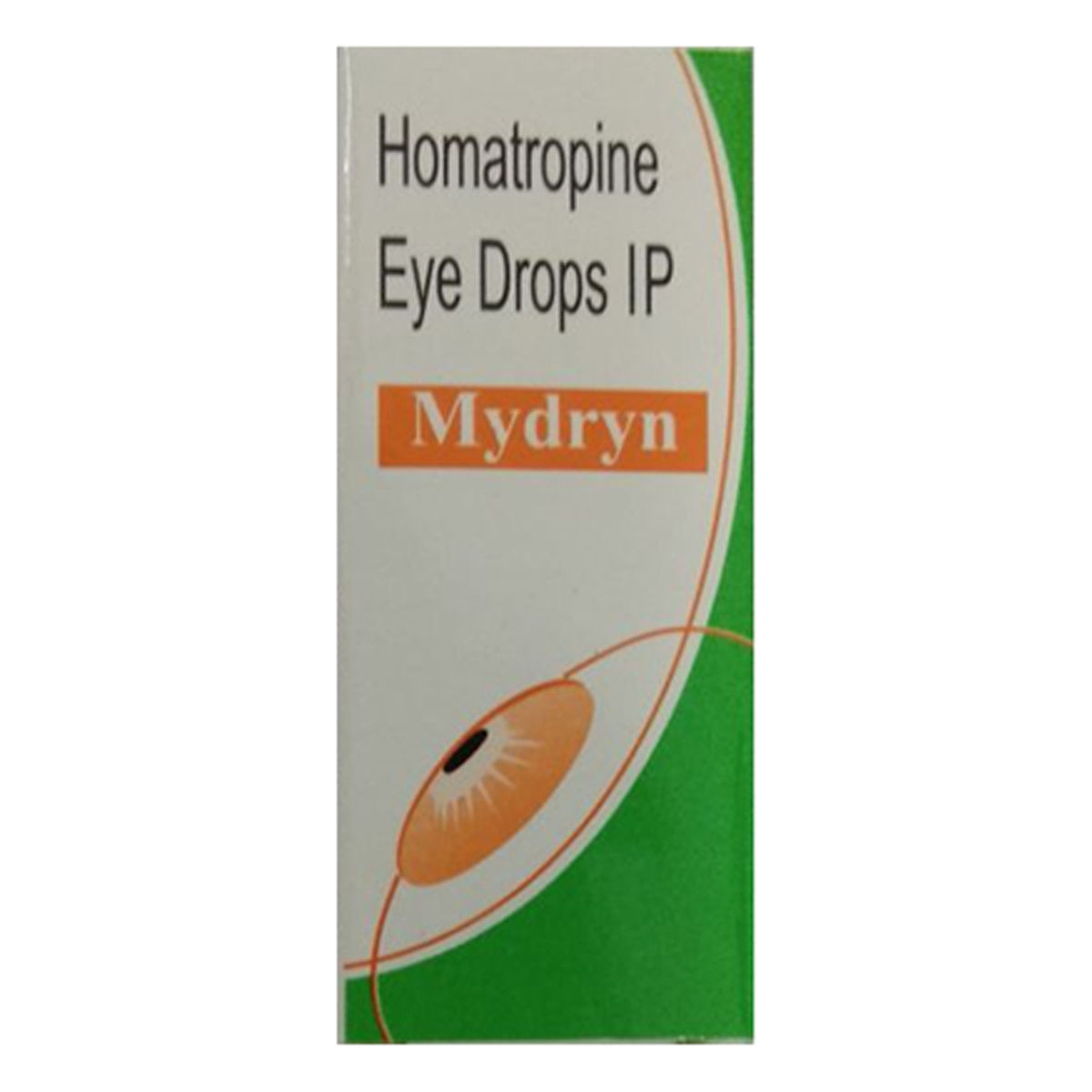Homatropine
About Homatropine
Homatropine is used to treat uveitis (inflammation in the eye). It is also used in the eye before a doctor's examination and after eye surgery to lower eye pressure. Any inflammation in the uvea (inner wall of the eye) is known as uveitis.
Homatropine contains Homatropine, which is anticholinergic in nature. Homatropine helps treat uveitis by relaxing the coloured part of the eye (Iris) and dilating (enlarging) the eye pupil. It also helps in reducing pain and inflammation. If a doctor has to examine the eye, using Homatropine helps examine the problem better as the pupil becomes enlarged.
Homatropine is for external use only. Before using it, break the seal and wash your hands to avoid any infection. If you wear contact lenses or wear them, remove them before using Homatropine, and you can put them back 15 minutes after using Homatropine. Close your eyes for 2-3 minutes and put as many drops as said by the doctor. You may sometimes experience blurred vision, a burning sensation, dry mouth, increased sensitivity of eyes, and a bitter taste in the mouth. Most of these side effects of Homatropine are temporary, do not require medical attention, and gradually resolve over time. However, if the side effects are persistent, reach out to your doctor.
Use Homatropine only if the doctor prescribes you. Never encourage self-medication or suggest your medicine to someone else. Do not take Homatropine if you are allergic to homatropine or have glaucoma. Check with your doctor before starting Homatropine if you have dry eyes, cornea problems, or liver disease. Also, Homatropine does not stop Homatropine abruptly, as it may lead to severe side effects. Do not take any other eye medication with Homatropine, without consulting your doctor.
Uses of Homatropine
Medicinal Benefits
Homatropine contains Homatropine, which is anticholinergic in nature. Homatropine helps treat uveitis by relaxing the muscles of the coloured part of the eye (Iris) and hence dilating (enlarging) the pupil of the eye. It helps in reducing pain and inflammation. If a doctor has to examine the eye, using Homatropine helps better examine the problem as the pupil becomes enlarged.
Directions for Use
Storage
Side Effects of Homatropine
- Blurred vision
- Burning sensation
- Dry mouth
- Increased sensitivity of eyes
- Bitter taste in the mouth
Drug Warnings
Do not take Homatropine if you are allergic to Homatropine or any of its ingredients, belladonna alkaloids (atropine). Inform your doctor about all the prescription and nonprescription medications you are taking, especially eye medications. Before using this Homatropine, please inform your doctor if you have any other eye condition or ever had glaucoma. If you are pregnant or breastfeeding, inform your doctor before starting Homatropine as a dose adjustment may be required. After using Homatropine, vision may become blurry, so do not drive a car. If you wear contact lenses or wearing them, remove it before using Homatropine, and you can put it back 15 minutes after using Homatropine. Wash your hands properly before using Homatropine to avoid any infection. Do not put two eye medications together. Maintain a gap of at least 5-10 minutes. Also, Homatropine may make your eye sensitive to light, so wear dark sunglasses when going outdoor.
Drug Interactions
Drug-drug interactions: Homatropine may have an interaction with certain antiarrhythmic drugs (quinidine), antihistamines (diphenhydramine, meclizine), antispasmodics (dicyclomine), antiparkinson disease (isocarboxazid, linezolid), anti-depressants (amitriptyline).
Drug-Food Interactions: Homatropine interacts with non-prescription medications, vitamins, nutritional supplements, and herbal products you are taking or plan to take.
Drug-Disease Interactions: Inform your doctor if you have or ever had glaucoma or any other eye problem.
Drug-Drug Interactions Checker List:
Safety Advice

Alcohol
cautionAlcohol is not known to cause any unpleasant side effects if taken along with Homatropine. But intake of alcohol with Homatropine may damage your liver. So intake of Homatropine should be avoided with Homatropine.

Pregnancy
cautionHomatropine may affect pregnant women or fetus. Hence, use Homatropine only if prescribed by a doctor.

Breast Feeding
cautionHomatropine should only be used if the benefits overweigh the disadvantages.

Driving
unsafeHomatropine can affect alertness and coordination. So, operating machinery which requires concentration should be avoided.

Liver
safe if prescribedHomatropine is safe is prescribed by a doctor in a liver problem.

Kidney
safe if prescribedHomatropine is safe is prescribed by a doctor in a kidney problem.

Children
cautionHomatropine can be given to children but under child specialist medical supervision. Make sure while using the Homatropine, it does not go into the child’s mouth.
Habit Forming
Diet & Lifestyle Advise
Avoid alcoholic beverages with Homatropine as they can make you dehydrated and affect the eye pressure.
Visit an optician regularly to monitor your eye problem.
Try to include heart-healthy omega-3 fatty acid-containing food drinks in your daily diet. You can also use low-fat cooking oil like olive oil, soybean oil, canola oil, and coconut oil.
A diet including green and leafy vegetables and fruits helps lower eye pressure.
Regular moderate exercise and appropriate rest are important for illness.
Fruits and vegetables which contain Vitamin A and C help to improve vision and recover from the disease.
Patients Concern
Disease/Condition Glossary
Uveitis: The inner wall of the eye's middle layer is called the uvea. Any inflammation in the uvea is known as uveitis. Common symptoms include redness, blurry vision, pain, and swelling. Sometimes, it can also occur after eye surgery.
FAQs
Homatropine is used to treat uveitis (inflammation in the eye). It is also before an eye examination and after eye surgery to lower eye pressure.
Homatropine contains Homatropine, which is anticholinergic in nature. Homatropine helps treat uveitis by relaxing the coloured part of the eye (Iris) and dilating (enlarging) the eye pupil. It also helps in reducing pain and inflammation. If a doctor has to examine the eye, using Homatropine helps examine the problem better as the pupil becomes enlarged.
Yes, Homatropine can cause blurry vision and may delay your thinking and reaction time. So, should not drive a car or do anything that requires alertness.
No, you should not use Homatropine if you have glaucoma or feel symptoms similar to glaucoma to avoid unwanted side-effects.
No, Homatropine should be taken in the dose and duration as advised by the doctor. If you take it in more than the recommended dose, it might cause unpleasant side effects. If you think your symptoms are not improving, please consult your doctor.
Yes, Homatropine may cause increased sensitivity of the eye. If you go out, please cover your eyes with appropriate protection (dark-coloured sunglasses).
If you miss a dose of Homatropine, take the missed dose as soon as you remember it. However, if it's almost time for the next dose, do not take a double dose to make up for a missed one.





